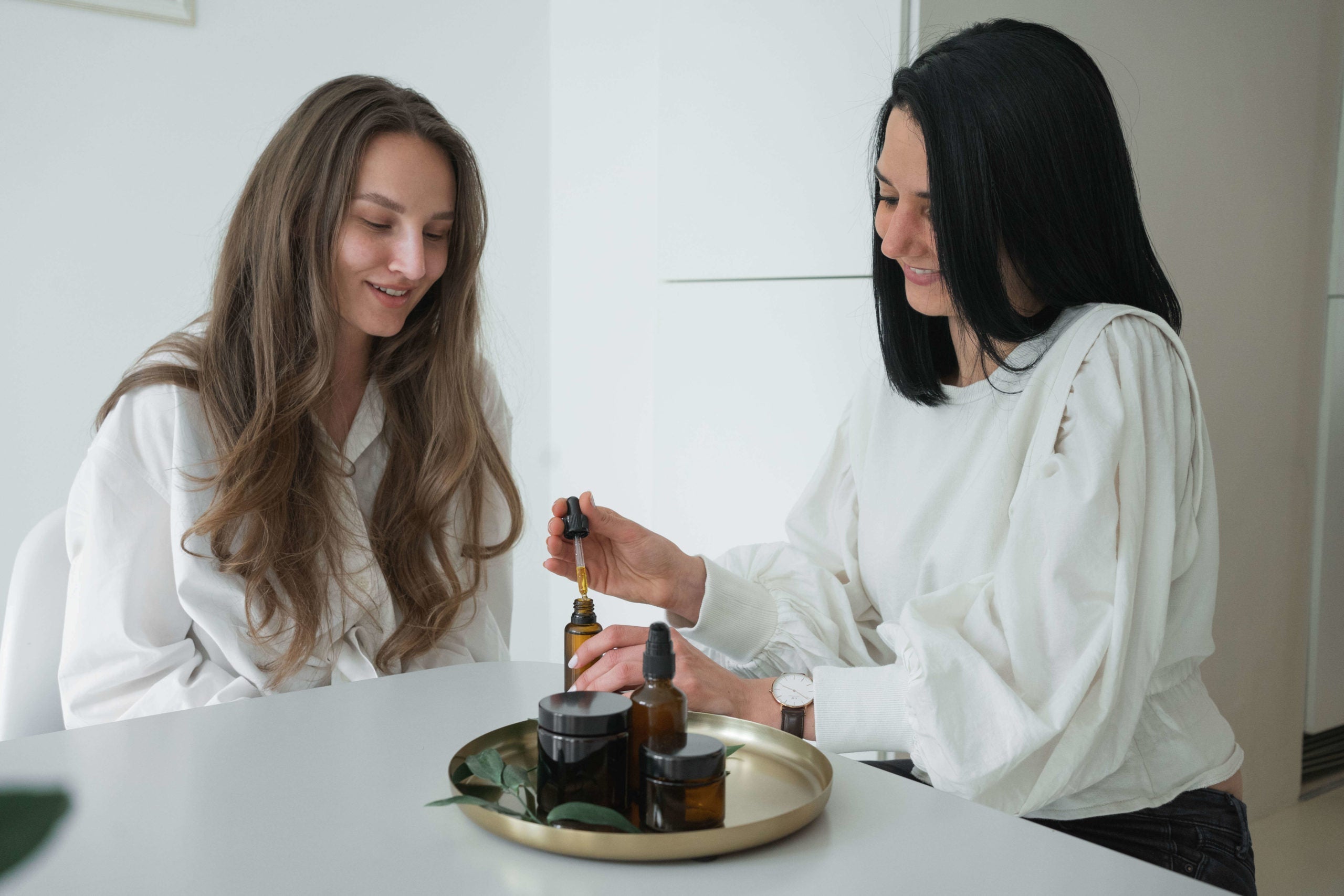As a qualified health and nurse, certified micronutrient consultant and beautician helps Marina Prskalo you step by step to one Better, holistic and naturally physiological skin care . In this guest article you will find out why Natural cosmetics are not always the same as natural cosmetics, why it is essential to pay attention to the ingredients in your care and why the intestines also play an important role in your skin health.
Natural cosmetics are not always the same as natural cosmetics
The demand of Natural cosmetics grows constantly. However, you should take a closer look here too, because nature is not just nature. Unphysiological substances are often used here that can harm the skin's ecosystem. The use of 100% natural physiological skin care, on the other hand, has the potential to combine health in all its aspects (body, mind and soul) with real active ingredients, to supply the skin with the right nutrients and, moreover, to be in harmony with the environment life.
The dark side of conventional cosmetics
Microplastics, petroleum products, mineral and paraffin oils are non-degradable substances that are mostly used in conventional cosmetic products. These non-physiological substances are foreign to nature and artificially produced and cannot be metabolized by the microorganisms in the skin. The skin's ecosystem becomes unbalanced.
The example with the banana peel and its plastic sticker
You're probably familiar with the little plastic stickers that are attached to bananas or other fruits and vegetables. But what actually happens if you throw the banana peel and sticker into the organic waste bin after eating it? First, the microorganisms living in the organic waste bin begin to metabolize the banana peel, for which they need a total of around 6 weeks. However, the microorganisms cannot do anything with the plastic sticker, so it remains undecomposed in the organic waste bin after six weeks, six months or even six years and hinders the inhabitants of the waste bin in their metabolic processes.
Something similar can be seen in the inhabitants of our skin microbiome:
Synthetic substances contained in many cosmetic products cannot interact optimally with the microorganisms on our skin. These substances often serve a specific purpose (abrasives, opacifying agents, durability, etc.) but do not have any positive effects on the metabolic processes of our skin.
A few facts summarized
The Federal Environment Agency (UBA) is clearly in favor of “avoiding microplastics in cosmetic products and looking for solutions to reduce them to protect the environment.” According to the UBA, there should be a Europe-wide ban on the “use of microplastics in cosmetic products within the meaning of Regulation (EC) No. 1223/2009”. Although the UBA expressly recommends that “no or as few as possible difficult-to-degrade substances” should be used in cosmetic products, in addition to microplastics, other synthetic polymers are used in cosmetics (Federal Environment Agency, 2021).
Parabens are hormonal substances that are often used as preservatives to prevent contamination and extend shelf life (Bavarian State Office for Health and Food Safety, 2011).
The dermal application of cosmetic products can cause parabens to be absorbed through the skin and enter the bloodstream (Janjua, Fredericksen, Skakkebaek, Wulf & Andersson, 2008). Due to their similar chemical structure, parabens, like the body's own hormones, can influence the sensitive hormonal balance, especially in women (Bavarian State Office for Health and Food Safety, 2011).
Since 2015, the EU Commission has banned the use of propylparaben and butylparaben in non-washable cosmetics for children under three years of age due to their potential endocrine activity (Commission Regulation EU No. 358/2014).
According to the European Food Safety Authority (EFSA), mineral oil hydrocarbon atoms (MFCs), especially aromatic MFCs, are suspected of acting as genotoxic carcinogens (damaging DNA, damaging genetic cell material, causing cancer) (European Food Safety Autonomy, 2014).
Naturally physiological intestinal and skin care:
Our body needs essential and non-essential fatty acids, both internally and externally. Essential fatty acids (i.e. polyunsaturated fatty acids such as Omega 3) cannot be produced by the body itself and must be consumed with food. They ensure that our cells remain elastic and the processes in the body run smoothly. They support regeneration, the production of hormones, cell renewal, the formation of membranes and the immune system. When buying fatty vegetable oils, you should always make sure that they are cold pressed and native origin and above all unrefined are. Refined oils increase the yield - but are bound with the help of solvents (usually hexane). In order for the health-threatening hexane to be separated from the oil, it must be degummed, heated, deacidified, deodorized, bleached and/or finely filtered. This means that all valuable plant-related substances (such as fat-soluble vitamins, phytosterols, carotenoids, antioxidants, etc.) have to say goodbye to the valuable fatty oil.
If you take a look at the cosmetics industry, you can see that skin care in the broadest sense can be traced back to dead substances such as mineral oils or paraffins:
Vegetable fats and oils
- Numerous plant-related substances
- Contain active ingredients
- Body can break down and metabolize fatty acids + glycerin
- Are absorbed by the skin = deep effect
- Are recognized by the microorganisms of the skin.
- Metabolically active
- Nutrition for the skin microbiome
- Promote the skin flora
- Have an antimicrobial effect
- Positively support skin functions
- Support the functions of the skin barrier
- Promote cell regeneration
- Repair the stratum corneum barrier
- Protect against environmental influences
- Protect against UV rays
Mineral oil / paraffins
- No accompanying plant substances
- No active ingredients
- Are not metabolized and are not degradable
- Are only adsorbed = no depth effect
- Are foreign to the microorganisms of the skin.
- Metabolically sluggish
- Damage the skin microbiome
- Weaken the skin flora
- Facilitate incorrect settlement
- Do not support skin function
- Do not support the functions of the skin barrier
- Do not promote cell regeneration
- Do not repair the stratum corneum barrier
- Does not protect against environmental influences
- Does not protect against UV rays
Fatty acids, such as those found in native and unrefined oils, must not be missing from healthy skin care. Applied externally, they strengthen and stabilize the cell membranes, build up the skin barrier and protect it at the same time. The high proportion of accompanying fatty substances allows for a good penetrating effect. In addition, native oils have a moisturizing and moisturizing effect on the skin. When used internally, the fatty acids also ensure a healthy intestine by promoting the diversity of the intestinal flora and fundamentally serving as an important building block for our cells.
The Gut-skin axis
As a certified micronutrient consultant and qualified beautician, I was able to see the impact of macro- and micronutrients in the diet and in connection with healthy skin flora. The right omega-3 fatty acids, zinc, L-glutamine, vitamin E and prebiotics can provide positive support for the skin and improve its appearance. Zinc supports wound healing processes and has a balancing effect on sebum production. So I really like using the myBioma microbiome analysis in order to be able to assess the intestinal-skin axis.

“With every wrinkle on your face you are writing your personal life-story that lets you grow and age naturally.” – Marina Prskalo
Who is Marina Prskalo? – the health nurse?
During my five years of work as a healthcare worker and nurse in a surgical intensive care unit, I was able to gain my first experiences with the topic of skin care. During my training as a beautician and make-up artist, I was able to delve deeper into the areas of skin and facial care. My work in an aesthetic practice ultimately led me to question conventional cosmetics. Ultimately, it was my further training in the field of aroma care that inspired me to combine my passion and my knowledge about the topic of natural cosmetics versus conventional cosmetics and to spread it. In this context, women's health is particularly important to me. Because in a world with models, Instagram, etc., an ideal of beauty is often suggested, which is known to be unrealistic. This false image often leads to a obsession with beauty, which seems to be endless even with Botox, fillers and the like. Because human nature is and remains aging - and every single wrinkle ultimately writes a story - a story that allows us humans to grow, develop and, of course, age.
“With every wrinkle on your face you are writing your personal life-story that lets you grow and age naturally.” – Marina Prskalo
My health-promoting advice is primarily aimed at women and men who want to devote themselves holistically to the topic of “naturally physiological skin care”. I combine my knowledge as a health and nurse with my additional training in complementary care - aroma care according to Section 64 of the GuKG. My experience as a qualified beautician/make-up artist and certified micronutrient consultant is incorporated into skin analysis and advice. If you are interested, please contact me by email at info@fyrb-essentials.com/Instagram unter fyrb.essentials
References
- Bayrisches Landesamt für Gesundheit und Lebensmittelrecht (2011)
- European Food Safety Authority (2014)
- European Food Safety Authority (2012)
- Janjua N., Fredericksen H., Skakkebaek N., Wulf H. & Andersson A. (2008): Urinary excretion of phthalates and paraben after repeated whole-body topical application in humans. In: Int J Androl 2008; 31: 118-30
- Umweltbundesamt (2021)







